[ 4 ]
14special report - Greater Las Vegas Association of Realtors
14special report - Greater Las Vegas Association of Realtors
- No tags were found...
You also want an ePaper? Increase the reach of your titles
YUMPU automatically turns print PDFs into web optimized ePapers that Google loves.
PROFESSIONAL STANDARDS SPOTLIGHT<br />
WHEN COMMISSION IS EARNED<br />
ERNST V. ENGEL: COURT CONSIDERS WHEN COMMISSION IS EARNED<br />
[ SUBMITTED BY JACQUIE KETCHERSID, PROFESSIONAL STANDARDS MANAGER ]<br />
An Iowa court has considered whether a<br />
salesperson was entitled to receive her usual<br />
commission split for transactions that were under<br />
contract when she left the brokerage but had not<br />
yet closed.<br />
Jo Ernst (“Salesperson”) has worked part-time as a real<br />
estate salesperson since 1987. Over the years, she has<br />
affiliated her license with a few different brokerages, as<br />
required by state law. In 1990, she affiliated with The<br />
Craven Agency. In 2007, broker Bruce Engel (“Broker”)<br />
of the Engel Agency (“Brokerage”) purchased The Craven<br />
Agency, and the Salesperson transferred her license to the<br />
Brokerage and continued to work out of that office. There<br />
was no written agreement establishing the terms of the<br />
relationship between the Brokerage and the Salesperson<br />
over the payment of commissions, including the time when<br />
commissions were earned.<br />
For the first two years, the Brokerage paid the Salesperson<br />
according to an orally agreed-upon schedule. Depending on<br />
the Salesperson’s role in the transaction, the Brokerage paid the<br />
Salesperson an agreed-upon percentage of the commission<br />
received by the Brokerage. In July 2009, the Broker told the<br />
Salesperson that he was going to close her location, but she<br />
could commute to the Brokerage’s other office.<br />
The Salesperson declined to commute to the other office,<br />
and made plans to move her license to another brokerage<br />
in her town and began telling her clients about this move.<br />
These communications upset the Broker, and he terminated<br />
the Salesperson’s relationship with the Brokerage. At the<br />
time she departed the Brokerage, the Salesperson had four<br />
transactions under contract with the closings pending.<br />
Following the Salesperson’s departure, all four of the<br />
pending transactions closed. The Broker reduced each of<br />
the commission checks from what the Salesperson had<br />
previously received when a transaction closed. The Broker<br />
sent the Salesperson a letter with each commission check<br />
explaining that the payment had been altered because of<br />
the additional work required by the Broker to complete each<br />
transaction. In total, the Salesperson had her commissions<br />
reduced by $8847.41.<br />
The Salesperson filed a lawsuit against the Broker, arguing<br />
that she was entitled to receive the entire commission<br />
amounts because she had earned her commission once the<br />
parties entered into the purchase contract. The trial court ruled<br />
in favor of the Brokerage, and the Salesperson appealed.<br />
The Court of Appeals of Iowa reversed the lower court. The<br />
trial court had determined that the Salesperson, per the oral<br />
agreement between the Broker and Salesperson, did not<br />
earn her commissions until the transaction closed. Since the<br />
Salesperson was no longer an employee of the Brokerage,<br />
the lower court determined that the Brokerage had no duty<br />
to pay her commissions for any of the transactions. The<br />
court ruled that the Salesperson earned her commissions<br />
prior to her departure from the Brokerage, not when the<br />
transactions closed. Looking at previous cases, other courts<br />
have determined that the commissions are earned once a<br />
binding contract is executed by the parties. Since there was<br />
no contract between the parties requiring the payment of<br />
commissions only on closed transactions and there was no<br />
other evidence establishing that the closing was required for<br />
commission payment, the court found that the Brokerage<br />
owed the Salesperson the entire commission amounts.<br />
Thus, the court reversed the lower court and sent the case<br />
back to the trial court with an order to enter judgment<br />
in favor of the Salesperson for the unpaid commission<br />
amounts. n<br />
Ernst v. Engel, 817 N.W.2d 31 (Iowa Ct. App. 2012).<br />
Source: NAR<br />
[ 28 ]<br />
SOUTHERN NEVADA REALTOR ® MARCH 2013 www.LasVegasRealtor.com


![[ 4 ]](https://img.yumpu.com/54356952/28/500x640/-4-.jpg)
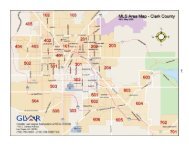
![[ 4 ]](https://img.yumpu.com/54357044/1/190x245/-4-.jpg?quality=85)

![[ 4 ]](https://img.yumpu.com/54357014/1/190x245/-4-.jpg?quality=85)
![[ 4 ]](https://img.yumpu.com/54357011/1/190x245/-4-.jpg?quality=85)
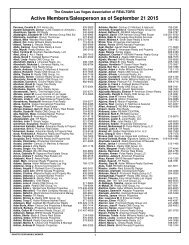
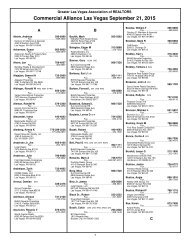
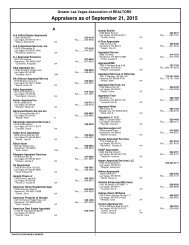
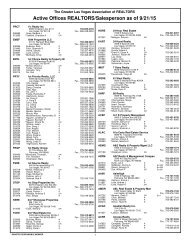
![[ 4 ]](https://img.yumpu.com/54356947/1/190x245/-4-.jpg?quality=85)